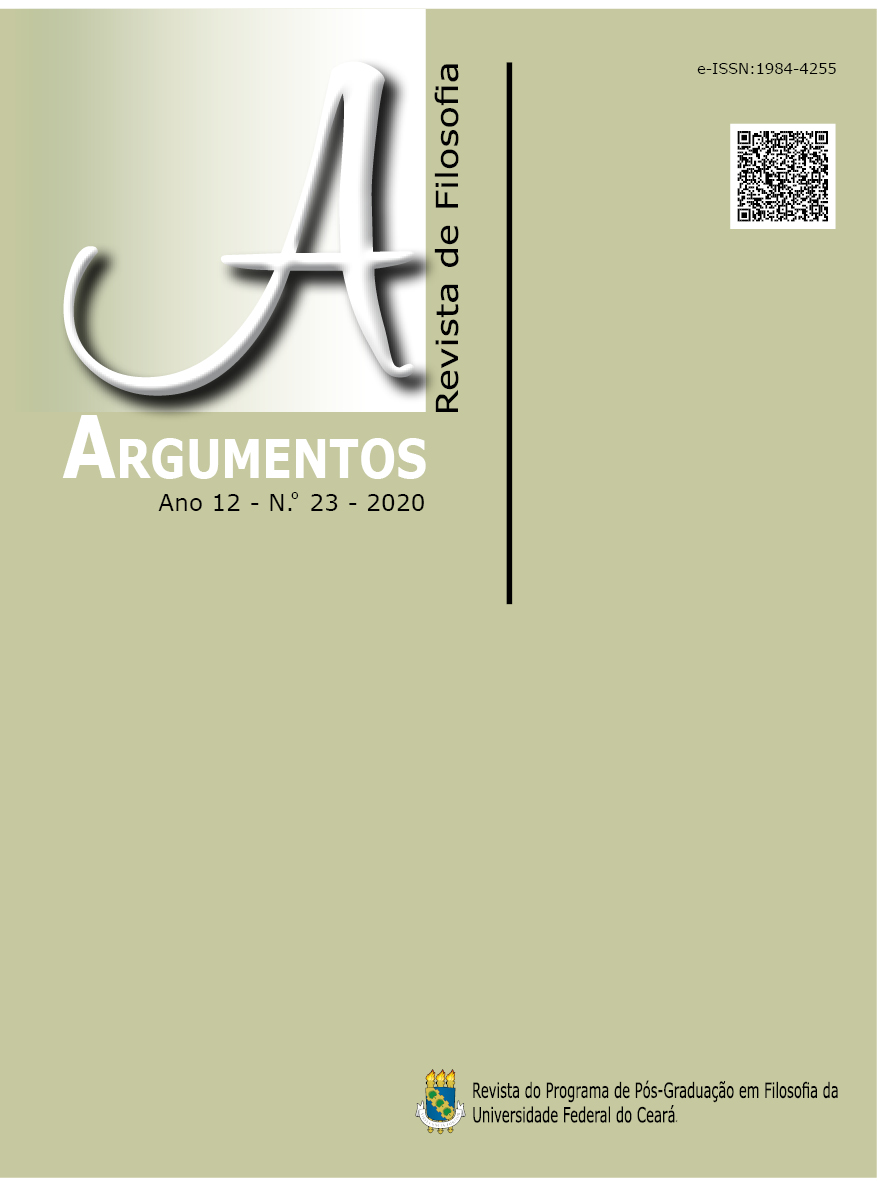The Aristophane’s speech in Plato’s symposium
DOI:
https://doi.org/10.36517/Argumentos.23.5Keywords:
Plato’s Symposium. Myth of Adrogynous. Aristophanes. Socrates. Love.Abstract
Plato’s Symposium is about Love (Eros) par excellence. Our work will focus on the discourse uttered by Aristophanes that, in order to speak of all the possible loves among men, will make what would be the first myth about gender, that is, the myth of the androgynous. It will be through this myth that it will be possible to establish a sense for the fullness of love between men or, as we prefer to say, an erotic whole that is formed from the division of humanity into three different genres. Aristophanes, in this way, manages to demonstrate the meaning of love in the widest possible way. At the end, aristophanic discourse will be confronted with the defense of the love given by Socrates and the relation he establishes between the erotic whole and the Good.References
Bibliografia:
Edições e Traduções do Banquete
AZEVEDO, M. T. S. O Banquete. Tradução de Maria Teresa Schiappa de Azevedo. Lisboa: Edições 70, 2001.
BURNET, J. Platonis Opera, recognovit brevique adnotatione critica instrvxit: Ioannes Burnet, Tomvs II. Oxford: Oxford University Press, 1901.
NUNES, C. A. O Banquete. Tradução de Carlos Alberto Nunes. Belém: EDUFPA, 2001.
Estudos
BRISSON, Luc. A Religião como Fundamento da Reflexão Filosófica e como meio de Ação Política nas Leis de Platão. Kriterion, n. 107, p.24-38, 2003.
DOVER, K. J. Aristophanes' Speech in Plato's Symposium. Journal of Hellenic Studies, v. 86, p. 41-50, 1966.
EDELSTEIN, L. The Function of the Myth in Plato’s Philosophy. Journal of the History of Ideas, v. 10, n. 4, 1949, p. 469.
HALPERIN, D. M. Love's Irony: Six Remarks on Platonic Eros. In: BARTSCH, S.; BARTSCHERER, T. Erotikon: Essays on Eros, Ancient and Modern. Chicago: University of Chicago Press, 2005, p. 48-58.
MORGAN, K. Myth and Philosophy. From Presocratics to Plato. Cambridge: Cambridge University Press, 2004.
NICHOLS, M. P. Socrates' Contest with the Poets in Plato's Symposium. Political Theory, v. 32, n. 2, p. 186-206, 2004.
SWITZER, Robert. The Topology of Madness: Philosophic Seduction in Plato’s Phaedrus. Alif: Journal of Comparative Poetics, n. 14, p. 6-36, 1994.
VEYNE, P. Acreditaram os Gregos nos seus Mitos? Tradução de António Gonçalves. Lisboa: Edições 70, 1987.
Downloads
Published
Issue
Section
License
Argumentos magazine is licensed under an International Creative Commons Attribution License.
The Magazine uses CC BY inclusion
1) The authors retain the copyright granted to the magazine or the right to initial publication, with the work regularly licensed under the Creative Commons Attribution, which allows the sharing of the work with acknowledgment of authorship and initial publication in this magazine.
2) The authors are authorized to contract additional applicable contracts, for non-exclusive distribution of the version of the work published in this journal (for example, publication in the institutional repository or as a chapter of the book), recognition of authorship and initial publication in this journal.
3) Authors are authorized and encourage to publish and distribute their work online (for example, in institutional repositories or on their personal pages) at any time before or during the editorial process, as they can generate productive changes, as well as increase the impact and reference of published work.




.jpg)










._._3.png)
1.jpg)
._._._.png)
